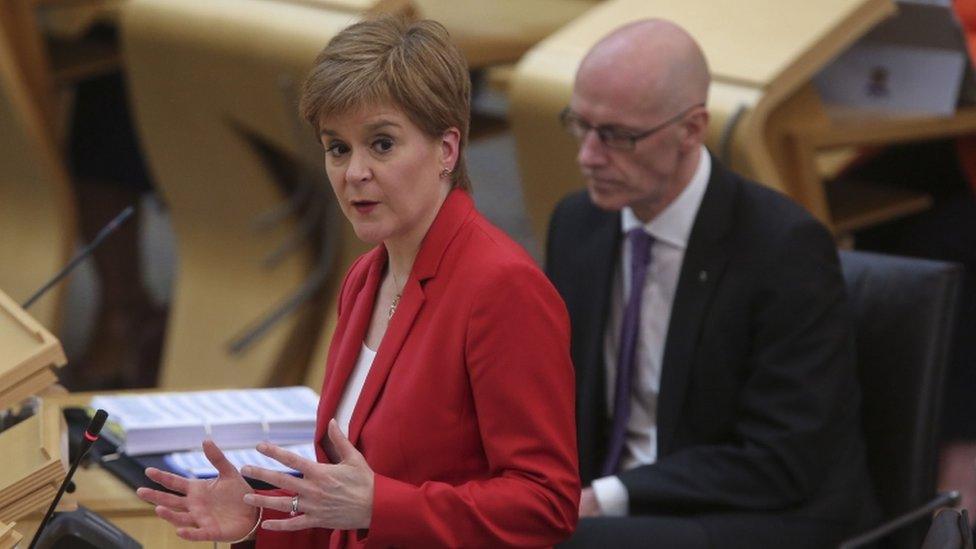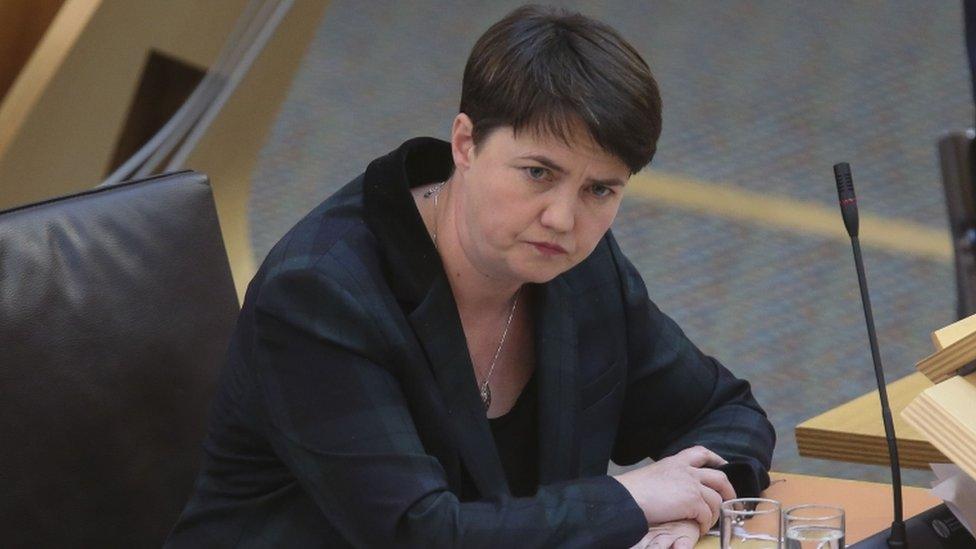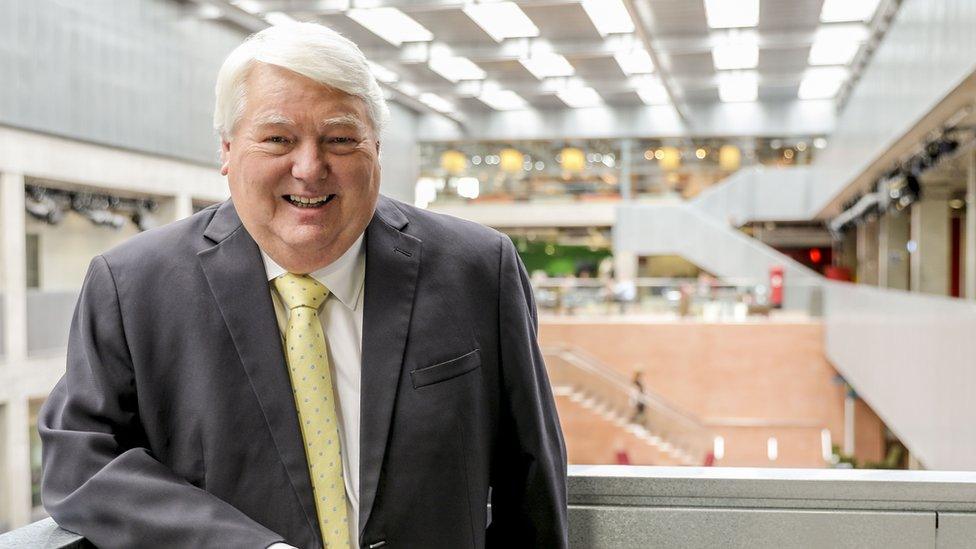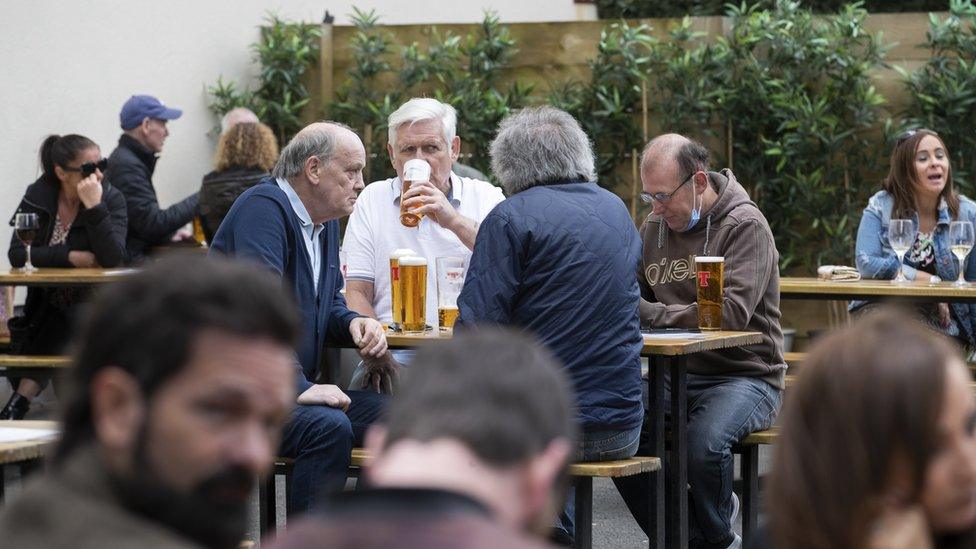FMQs: The season of the virus
- Published

The seasons may be turn-turn-turning, but coronavirus remains ever-present
You may know the phrase from Ecclesiastes. You may be familiar with it from the Byrds. But be assured that for every thing there is a season.
Most especially this hideous plague. It too changes, adapts and mutates. The concern now is that the season ahead may be gloomier than we had hoped.
Which prompted the first minister to open today's exchanges at Holyrood by declaring that it was not yet time to move Scotland into Phase Four of our staged exit from lockdown and constraint.
And why so? Because Phase Four contains the presumption that the virus no longer poses a threat.
Which is palpably, demonstrably, grimly far from the evident truth. Cases are rising - and the fear is that an increase in incidence will be followed by an increase in mortality.
Just as this virus - and indeed everything - has a season, so it is the case with political discourse. Things change. The tone, the temperature shifts.
We have become accustomed in recent weeks to vitriolic exchanges between the opposition front benches and the first minister. More narrowly, that has been particularly true of the Q&A featuring Ruth Davidson of the Tories and the FM.
And today? All changed, changed utterly. The discourse was modest, measured and near-consensual.
So what can have happened? Perhaps it is a factor of the mental and social exhaustion on display around us. Perhaps, all passion spent, our political leaders are toning down the rhetoric.
Perhaps it is a response, conscious or otherwise, to public opinion. Folk, especially worried folk, seldom like to witness anger, authentic or otherwise.
And, trust me, our folk are worried.

Nicola Sturgeon has hit the brakes on plans to loosen lockdown
I think, though, that another element may be responsible. Our leaders too are hugely and commendably anxious. This hideous beast of a virus is too big, too persistent, too determined to spread.
Hence, I believe, the sombre and solemn tone at Holyrood today. This is just too serious and, above all, too enduring to permit an exercise in rhetorical display.
Nicola Sturgeon, of course, had struck the opening note. Not only was she applying the brake pedal to the loosening of a series of constraints, deferring them by at least three weeks.
She was announcing a further tightening, matching the prime minister by setting a single limit of six upon indoor and outdoor social gatherings, with key exceptions.
All part of an exercise to gain public compliance by simplifying the rules.
I was struck once more by a leitmotif deployed by the FM to the effect that it is nobody's fault that the virus is spreading again. Specifically, it is not the fault of young people.
This is a tricky argument to advance. For, in the next breath, she talks of a universal responsibility which lies upon all of us. Responsibility but not culpability.
However, the distinction is readily understood when one considers context. The FM wants compliance, not a blame game.
She calculates that people - and perhaps, especially, young people - will respond badly to an accusatory approach. Far better to appeal for a community response, considerate of one's neighbours, friends and family.

Ruth Davidson backed Nicola Sturgeon's approach
For the Tories, Ruth Davidson responded in kind. She backed the FM's approach - while noting that the latest statistics offered a reality check to us all, in Scotland and throughout the UK.
Her questions were precise and targeted, seeking information rather than advantage. Prompting action, not indignation.
Labour's Richard Leonard does not have to look far at the moment to discern political disquiet. A brief glance behind him would suffice.
However, he contrived to surmount such troubles - and pose detailed, valid questions about testing which drew a thoughtful response.
Patrick Harvie of the Greens raised the question of pupils with additional support needs. He warned their requirements were being neglected. Ms Sturgeon promised to respond.
From Willie Rennie of the Liberal Democrats, there was perhaps just a hint of residual bite. But he too kept it focused, challenging the FM over testing and quarantine arrangements.
Mr Rennie concluded that the current state of the virus meant "turning a dark corner" in people's minds and hopes.
Let us all wish that, in due course, with the passing of the seasons, we may witness a revival of optimism.

Brian Taylor is retiring after 30 years as political editor
PS: A few of you may have noticed that I am about to embark on a new phase or season myself. I have indicated that I will step back from my role as BBC Scotland Political Editor at the end of October.
Something about a departure around Hallowe'en appealed to my inherent sense of mischief.
The news emerged just as I was preparing for another broadcast, anent FMQs. I like that; a sense of continuity, after some 35 years with the BBC and 43 years in journalism.
As I have noted elsewhere, it has been a pleasure, a privilege and, not infrequently, a source of innocent merriment to broadcast to you all for such a prolonged period. On the telly, on the wireless, and here online.
I hope to be able to play a role in charting Scotland's future, albeit a different one.
In due course, I will wish you all "toodle-oo the Noo". With the stress on "the Noo".
- Published10 September 2020

